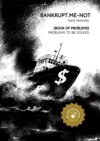Kitabı oku: «The Art of Winning. The Startup Guide», sayfa 2
From a leader to an entrepreneur
What makes an entrepreneur? The striving for competition, driven and stimulated by healthy ambition. Here a harsh axiom comes into play: only one shall be left in the end. That is the sort of masochism, characterizing any entrepreneur – the need to catch up with their opponents, to surpass them, to reach the top. Sometimes it is not so much the result that is important, but rather the process nourished by the spirit of competition – the source of the propulsive force.
An indispensable part of competition is the evaluation by each and every entrepreneur (both fledgling and experienced) of their level of ambition. For some, a fruit stall is the limit, for someone else it is a plant, for yet another it is a corporation or an international holding.
For instance, in sports there is always a champion, who sets the bar for everyone else until this leader inevitably loses, and their once-high achievements become run-of-the-mill entry standards to any sport schools. The same kind of dynamics characterizes the current situation in business, which is why you should be able to evaluate competitive abilities correctly. Entering the business world is not like finding a usual job, and not every burgeoning entrepreneur is ready for the upcoming struggle.

Successful entrepreneurship requires three motivational causes:
1 – eagerness to compete
2 – eagerness to keep developing your business
3 – eagerness to learn
Eagerness to compete
Even if at the beginning you are not “one of a hundred”, those whom I talked about in the previous chapter, but you have set a goal and you are persevering to achieve it… In a while you will be able to join the ranks of the most successful entrepreneurs. Provided that you are not afraid of the competition, of experimenting and finding original solutions for market expansion, developing new products, and offering new services, entrepreneurial luck is sure to wait upon you.
Learn from the strongest and the best – this is the most effective way to pass the stage of original accumulation of capital faster than your opponents. But never steal intellectual property, never infringe copyright: you can steal a bucket of water, but not the spring itself.

Eagerness to keep developing your business
Being an entrepreneur always means being an “owner” rather than “someone, who holds the purse strings”. He or she makes the money work through creative projects, and then hires managers for these projects. A rentier, i.e. someone who lives off the interest from their investments, is not an entrepreneur. Stopping and saying “that’s enough” means reaching the level of your own incompetence. Surely, there is nothing bad about it in itself, but when this moment comes, even the strongest leader stops being an entrepreneur.
Eagerness to learn
You can widen the limit of your competence. And every time I reach those limits, I tell myself: if you do not learn, you will turn into a lifelong manager. Mind you, being a top-class manager is good too, but I have always wanted to have a business of my own.
There are a number of gifted entrepreneurs and naturally talented people capable of building a business out of thin air, as they say. But the majority have to keep improving their knowledge and raising their level of professionalism.
– Business case —
…I have already told you about my experience of working in a big corporation. Half a year did it for me. And the biggest vice that I discovered in the course of those six months was that ignorance dominated at all management levels. Their way of thinking was decades behind our time. It is no wonder that for many years Russian automobile plants have been virtually devoured by foreign companies, not as leading businesses bought as successful investments, but as platforms for a fast entry into the Russian market.
Having returned to the world of entrepreneurship, I left my position of CEO for that of a hired manager and went to study first in Switzerland, then the USA and Japan. I wanted to absorb the most progressive ideas in industry, marketing and logistics, understand how the already successful businesses develop, and how you continue building up entrepreneurial success.
The thinker, researcher and classic capitalism author Karl Marx said that when someone “learns to walk he also learns to fall, and it is only through falling that he learns to walk”.
One of the elements of a successful business is the choice of the right field, or, colloquially, the right “turf”. It is possible that after all the failures and misfortunes in the area you originally set your heart on, you are still willing to persevere. However, you are very unlikely to achieve anything. The failures will overstrain you, undermine your abilities, and, most importantly, destroy your confidence.
Never be afraid of experimenting when searching for a suitable field and environment for a business.
For example, wholesale purchasing of food from individual or collective farms and subsequently selling it by retail is rather a simple thing, but it requires a lot of physical labor (driving around, meetings). Not everyone is able to endure so many business trips and negotiations. Then the entrepreneur, having no time to manage all aspects of their business, decides to hire employees. They have to share the profits with them, and at this point it is important to balance the expenses, in order not to go bankrupt. Lack of profit or, even worse, loss of money is bound to cause disappointment and break your entrepreneurial spirit. Making profits is the main purpose of any business.
If an entrepreneur does not set him or herself the goal of making profits, and is trying to fulfill the desire to be appraised by someone without relying on the final results, they will inevitably find themselves at a dead-end.
In the world of entrepreneurship success is estimated solely on results, not intermediate actions. After all, the winner is determined by the score. Remember, the people around you are not going to judge every step you take.
Admirers, critics and analysts – everyone who is ready to buy the fruits of your labor and call you a successful entrepreneur, will appear only after results are reached.

If there are no results, everything seems pointless and you find yourself face to face with your failures. It does not matter that the failed entrepreneur was an art patron, that they helped the weak and the poor: they become a “nobody”.
If a company collapses, a good lathe operator or a baker will always find a new employer. Hired workers have it much easier: they collect diplomas, ranks, titles which have an impact on their competence and rates of remuneration.
As for entrepreneurs, having no qualifications, rank or title, they might not find their path a second time. There have been numerous examples in history when owners of great fortunes went bankrupt and found themselves on the margins of life.
Nevertheless, surely everyone has the right to go back to entrepreneurship. A potential merchant or industrialist may return to business after being a hired worker. If a person is aspirational enough to dream of becoming a member of the royal family, getting a title of nobility, earning billions, then ambitions supported by the abilities and extremely hard work will help him or her to reach the desired level, or at the very least pave the way for his or her children. That is what happened to Ford, as well as many other well-known European and American entrepreneurs. But 99.9% of people who start their own business do not focus on such lofty goals. Maybe, they should: sometimes the impossible is possible!
As a rule, going back to being an entrepreneur after a failure is much harder because of the looser label, which is both an inner, psychological and an outside manifestation. This is another reason why it is not worth going back into the area where you once failed. Of course, there are exceptions to this rule, but these are few. It is better and safer in every way to drop out of the game prior to a total meltdown, which will give you a small chance of recovering in a different field, either related or opposite.
Business growth, occasional bad luck and even state of instability – these are equally constant elements of entrepreneurship.
Business is more demanding than sports, it is better to give up bad habits and hobbies at the very outset of your business career. Your regime becomes totally dependent on your work and is no longer regulated in accordance with the orthodox eight-hour working day and a five-day working week. Business takes over all your free time, especially at the beginning. The environment for a leader after becoming an entrepreneur requires mobilization of all physical and psychological abilities. This is something that not only the burgeoning entrepreneur, but also their nearest and dearest should be prepared for. You should not expect to stay afloat working half-steam. This would mean fooling yourself: there are no such things as half-measures in business.

I mentioned before that when business starts consuming all an entrepreneur’s time, he or she inevitably hires people to boost production and sales. But it will not get any easier unless you concern yourself with the HR policy, get to know more complicated accounting techniques and arrange the production system. In this case it is very important to perfect the schemes and mechanisms of profit-making in the face of growing expenses (salaries, the amount of rented facilities, transport, etc.). Theoretical knowledge given at colleges and universities is not enough. Until the aspiring entrepreneur fully understands the entire mechanism of controlling overhead expenses in the course of the production process, and then gains the first profits, they will never get the feel of how their business is functioning. Evaluate the advantages and disadvantages of certain steps you take, dispose of the first and increase the second. And even if the business is growing successfully, one should never stop developing it, otherwise the vector of luck will immediately go down.
The job of an entrepreneur is an endless succession of events and struggles. If you are truly interested in business, you should accept a simple truth: entrepreneurs virtually exchange their time, their loved ones, and themselves, for what they do and love.


Being a “composer”
Becoming an entrepreneur is not something you can do effortlessly. But you can become an entrepreneur following the rules of the consumer market, and at the same time breaking them. This is something that only people with non-standard abilities and ways of thinking can allow themselves to do.
The crucial quality of a future entrepreneur is the ability to “compose” the process. An entrepreneur must be a “composer” or aspire to become one.
It is great for a burgeoning entrepreneur to combine the qualities of a “creator” and an “organizer”. A businessman must not only be able to “create a melody”, but also to “organize” its production and marketing, moving from the handicraft stage to one of modern structured production.
Creativity, aimed not only at producing goods and services, but also their marketing is the cornerstone, or one might even say, the philosopher’s stone of entrepreneurship.
Many examples of success on the market are based on exceptions, and it is those exceptions that modern gurus use as the basis of their training programs in business schools. However, the reality of business is way beyond the examples of Coca-Cola, McDonalds, Microsoft, Ford, Trump or Steve Jobs.
The overwhelming majority of aspiring entrepreneurs do not understand how it’s possible to create a miracle such as the internet.

Entrepreneurship is a daily routine, full of headaches and hard work, which very rarely turns into a celebration of unexpected financial success. Moreover, success must never be a one-time thing, but a matter of years of stable growth. A business process can be compared to an escalator that only moves downwards. Want to be successful? Walk upwards! Want to get ahead of the others? Run without stopping!
So, your business has taken off, you reached your first success – you allow yourself to buy an expensive car and an elite house, guided, at times, not only by your own desires, but rather by established traditions…
A villa, a yacht, VIP-resorts, exotic countries… Out of fear of losing it all, the entrepreneur holds on to the steering wheel of their business so desperately that it gives them white knuckles. But as long as you are driving on your own, you remain a manager. This kind of a “split personality” – the owner and the manager – is like being a composer, who spends most of his time at the piano, but simultaneously acts as a musician in the orchestra of his own creation. To avoid wasting energy that can be channeled into creativity, the “entrepreneur-composer” must only “compose” the business, and the management itself can be delegated into the hands of a hired manager.
Success in the competitive struggle is a result of constant growth, as well as an ability to suggest new interesting methods of promoting your products and services, and constant renewal. If at the same time the entrepreneur remains a “composer”, they will always be one step ahead of their opponents.
However, there is a limit to any development, so we are inevitably facing the following question: how can you determine your maximum? Should you be satisfied with owning a cigarette stall, a hairdresser’s, or a small bakery? Is there a possibility of running a life-long small-sized business, limiting your expenses at the very beginning? Originally no one thinks about how high they will rise, but even those who sell homespun stockings, or stamp metal, want their products and their mastery to be recognized by the maximum number of people.
Recognition is measured in demand. “I want to produce something worth a dollar, but I want every person on the planet to buy it” – this is the kind of thinking appropriate for a burgeoning entrepreneur.
– Business case —
…I have witnessed a number of my friends open their businesses and suddenly their ambitions change and develop in new ways. One such company is now working with tent materials and has become one of the strongest and most well known in its segment. When they started, the business owners (a married couple) sold shoes bought wholesale and sold retail, accumulating experience, competence and the original capital. They visited Italian plants, increased the number of sales points, but at a certain moment they suddenly decided to sow tents for motor trucks.
Why would they shift into a totally different field? The answer is simple: they were unable to resist growing competition within the shoe business. And their “composing” talent told them to change the market, channel their efforts into a field where the competition was not so harsh.
At that time, the market for tents was empty and growing. At first, they decided to collaborate with “Kamtent”, a company from Tatarstan, but pretty soon an independent company “Nizhtent” was born. In the course of the first decade, “Nizhtent” not only became a dominating company in its region, but also started developing in other parts of Russia. The equipment they bought, and their production sites with dozens of well-trained employees, allowed them to step into making pavilions from tent and other special materials, and later rent them out. All that was possible because they chose to leave the “narrowing” shoe market and move to another guaranteeing them stable business growth.
I started by selling spare parts, but one day strolling through a market, I noticed that dashboard components (there were over a hundred of them) were sold separately, and all the parts, including the tiniest ones, were in stock. Adding up the price, I realized in the same market a full dashboard was two or three times more expensive. So I bought all the components, assembled a dashboard and sold it at the nearest consignment shop, thus doubling the capital I had invested in the components.
In a few months several dashboard assemblers were working in my shops, and in the following years my fledgling business produced thousands of dashboards for the growing automobile market.
Just as one cannot write a score without notes, or become a composer without an ear for music, an entrepreneur can never develop and expand their business without education and discretion.

I have travelled and studied a lot, and visited various business-schools. One training program in Switzerland was based on a very useful slogan: “Pry!”
Pry and learn: the path that others have already walked is something to be studied as quickly as possible. It is very important to get to know the process intimately, to try and come to grips with everything that is connected with supplies, to find out how dealers and distributors work in the field that you are interested in, what are the legal norms, the taxes and the limitations, what licenses are required, and how your products or services should be licensed.
– Business case —
…A buddy of mine, having already become a successful entrepreneur in the wholesale and retail food trade, decided to start a second business. In no time at all he bought equipment for the production of toothpicks and opened a small workshop. He had learned the technological process somewhere and reasoned that having over fifty shops (and the experience of selling large batches in other friendly retail networks), it wouldn’t take long to make his toothpick business a profitable one. Unfortunately, neither his business experience, nor the perfectly copied technological process helped him, because, as it turned out, he did not have the entire “score” for the process of producing toothpicks. It was very important to determine certain things. How much was the cost of a cubic meter of timber? What quality timber should be used? Was there a possibility for regular cooperation with a serious supplier and how should one deal with packaging?
He opened that production line because he owned a small forestry, which could provide him with cheap timber of any size and quality. But it transpired that timber logging, production of toothpicks, packing and selling them are separate businesses that vary in profits, volumes and complexity. When the entrepreneur combined them, the result he got was a failing toothpick business he subsequently had to sell along with the logging business. As for food retail, he is still very successful in this field.
Once I decided to help someone build a business from scratch. I was sure that in order to do that it was enough to use certain knowledge that I had, chose the right product and a place to sell it, and everything would work. We chose the German leather brand “Picard”, bought a sufficient amount and wide range of products directly from the plant, and with the highest possible discounts, brought them to Russia, went through customs, and opened two sales points. Successful sales continued for only ten months, while the owner of the business was in charge herself. However, then she had to delegate management to a trusted top manager. After a while the business stopped bringing profits and was finally shut down.
However “correctly” a business is organized, it should be managed by its owner. No consultant will ever arrange a business so that it keeps bringing continual profits without any participation from the entrepreneur, because as the “play” of the business is being written (a business process is never embalmed), only an “entrepreneur-composer” can make changes and be consistently successful. But the business process itself will never be over.


Are you an entrepreneur or a manager?
Business is a process that requires constant management and there is no better manager for your company than yourself. And yet, after a while the entrepreneur had better let go of the steering wheel and delegate the administration of the business to someone else. Business trips, endless lines for various permissions in the offices of state officials, exhibitions, conferences, purchases… thousands and thousands of things to do! Naturally, a lot depends on the business format, but as your company grows, you slowly realize you have to hire a top manager, who will take on the responsibility for making quick decisions and getting results.
I hired my first manager when my staff consisted of only fourteen employees and my business was less than three years old. After that I have never been a senior manager in any business that I owned; even as the CEO of my enterprise, I always hired a COO. As far as I am concerned, nothing is more effective than a well-arranged work process, in which the owner is working on business strategy without shifting his or her attention to everyday problems, and an experienced top manager is successfully running the company.
A fair question comes up: to what extent can the hired manager be trusted?
Surely, there is a lot of treachery in business, especially in a young business. However, in spite of cases of material and intellectual property theft, as well as all kinds of double-crossing, the risk is justified: delegating control to a hired top manager allows the aspiring businessman to mature into an entrepreneur much faster.
Take transport insurance as an example to illustrate this. If you are buying insurance for one or two cars, then extra insurance (along with the obligatory one) may be justified. However, buying extra insurance for ten or more cars is a waste of money. I noticed this correlation in the fifth or sixth year of running a business, when I realized that I was annually spending about 700—800 thousand rubles on transport insurance, and the accidents that did take place required only about 200 thousand rubles worth of repairs a year.

Thus, I was losing 500—600 thousand. In other words, supposing that the average price of even the most expensive car was about a million or a million and a half, I could write off a car every two years and buy a new one, while their service life was supposed to be no less than 5—7 years. I stopped buying extra insurance for my commercial transport and started saving significant amounts of money. The same applies to treachery and theft: such situations will occur infrequently provided you are orderly and attentive to your staff and your business processes. The benefits you will get from delegating part of your personal responsibilities to top managers is far more significant.
– Business case —
…After two years of working for me, my first administrator was simply bought: someone offered him a higher salary. But he left honestly and I did not hold a grudge, although usually entrepreneurs are uncertain about these kinds of situations and mostly see them in a negative light.
In the fifth year of doing business, my partner who was at the same time the top manager was caught red-handed: he submitted a fake waybill for purchased products, claiming the goods were several times more expensive than they actually were. I had to fire him and split the business – we went separate ways.
Ten years in, my CEO was caught stealing and took off (by then the staff already consisted of two hundred employees). Frankly, it was a textbook case: not just stealing and running away, but also preparing to launch a similar business with new partners. To carry out the plan, he “recruited” the best engineers from my company, who at the time were working on the latest automobile models and designs.
Fifteen years in, one of my top managers in charge of exports stole our technical documentation, made a deal with my competitors and tried to launch production of new car models designed by my company.
Four incidents in the span of twenty years of doing business – it is a lot, and at the same time not too much. To an entrepreneur who is not prepared for these kinds of trials, all of the described situations would feel like a stab in the heart. I am proud to have endured that baptism by fire honorably.
Everyday mundane tasks don’t let you look beyond the routine and consider the prospects for future business development, to see how the wind blows and feel the changes; it does not give you enough time to maneuver. The mistakes of a top manager are painful, but they can be fixed, even by you yourself. As for your own errors, there will be no one to correct them; in the majority of cases no one will dare to point out bad decisions, and moreover, an outside perspective on the actions of your subordinate managers is always more accurate.
So, at what point should an entrepreneur hand over his administrative responsibilities to someone else? When is the time to stop slaving over hundreds of small details by yourself? The answer is obvious: the sooner – the better!
I have already mentioned that in the second or third year of doing business, I started handing over more and more responsibilities to my subordinates. I hired an administrator and started going to exhibitions, flying to other countries, purchasing goods from the Middle East, searching for potentially new business lines. At the time, I was not skilled enough in arranging my security system, I did not know how to ensure my intellectual property was well protected, and as yet my company was not well-known. The promotion of goods and services on the market was based on sheer enthusiasm and a wild eagerness to stay afloat under the pressure of competition, which I believed to be unimaginably harsh. Over the next few years my business grew bigger and stronger. Five years in, more than fifty people were working in my workshops; there was not enough space for manufacturing, storage and office work. In our market niche, we became one of the three major companies in the city. Management was the responsibility of hired top managers although, inevitably, I was always by their side. But for me, as an entrepreneur, the main task was to look for new ways to develop, “compose” new products, and discover unexplored markets.
I have seen various systems and methods of business management: from scientological to completely anarchic ones. The question of how to manage personnel always raises a lot of arguments. But the truth most likely lies somewhere in the middle, and the question of what management framework should be used depends on the entrepreneur who arranges the system of business management on their own.
Now I know for a fact that no strategies of business management are totally right or totally false. There are entrepreneurs who never hand over their managerial responsibilities to anyone else, but there are also those who try to delegate as much control as possible.
An entrepreneur can be a wonderful manager and, perhaps, no one will ever do this job better. Yes, you can appoint yourself CEO, the chairman of the board, the president of the company – anyone you want. But why would you do that? In this case, you will remain a mere executive, and an entrepreneur should be the owner – it is more important, especially for those around you.
– Business case —
…We were being introduced to our colleagues at a meeting in one of the Middle East countries. There were over ten people of different ages, social status and, naturally, position in business. My CEO was introduced – one after another they held out their hands almost without standing up. Then it was time to introduce me. As soon as the word “owner” was pronounced all of them stood up as one and started greeting me eagerly, attentively looking me over. This incident left a lasting impression. It was then that I realized what role was assigned to a business owner by society governed by a market economy.
It is not just reverence for the work of someone who took the risk of becoming an entrepreneur, but also respect for the huge responsibility that any entrepreneur has regards their employees, suppliers and business partners.
It is hard to let go of the steering wheel and it is even harder to make yourself believe that someone can do the job just as well, but the employment of management specialists is a modern trend. Complicated accounting requires professional accountants, a huge amount of existing and constantly changing laws makes it impossible to do without lawyers, and the use of computers in office work calls for the hiring of system administrators.
The world is gaining pace, and one must keep up with the innovations, otherwise an entrepreneur is doomed to keep being late, wasting time catching up with others.
– Business case —
…Once my company prepared a new design for a cash-in-transit (CIT) car. But all attempts to convince the clients that the new design would improve the working conditions of the CIT guards and enhance the protection of the valuables transported and the crew itself proved useless.

The clients preferred to risk their valuables and their people and avoid spending money on upgrading the CIT cars and improving their design. At that time, most CIT car manufacturers tended to substitute real armor plating with simple steel. One company even created a legend that it was covering metal sheets with a special hard-facing powder that imitated the armoring of a CIT car; in this way, the trickster-entrepreneur achieved lower costs. And the banking market and its officials accepted those vehicles, while hundreds of CIT guards remained in constant danger. The cost of such behavior was people’s lives and stolen money in the amount of millions of rubles.
At that time, I made the decision to leave the CIT cars’ market. By the way, the CEO who was working for me disagreed with my decision. But I understood that sooner or later the market would see through the trickery and discard it, and those who had disgraced themselves would never be able to restore their reputation. As for me, I wanted to build a business “for keeps” – not just for myself, but also for my sons. And I was right: 20 years of competition in the CIT car market destroyed the majority of trickster companies, and clients began to realize that there should be no weak spots when it comes to security. That is why today there are just a few serious manufacturers who care about price, quality, service, variety of options, and consideration towards their customers.
Ücretsiz ön izlemeyi tamamladınız.
















